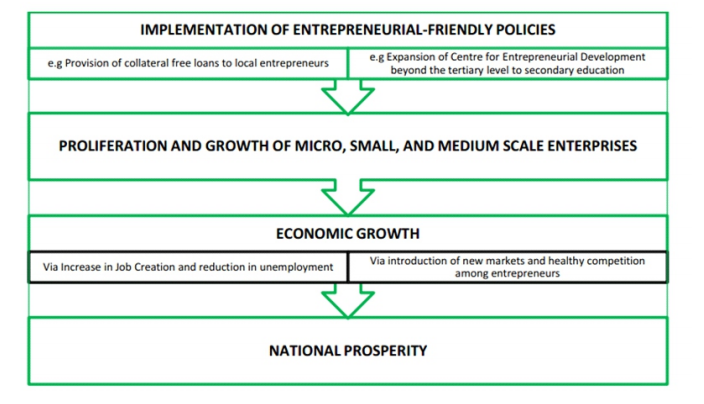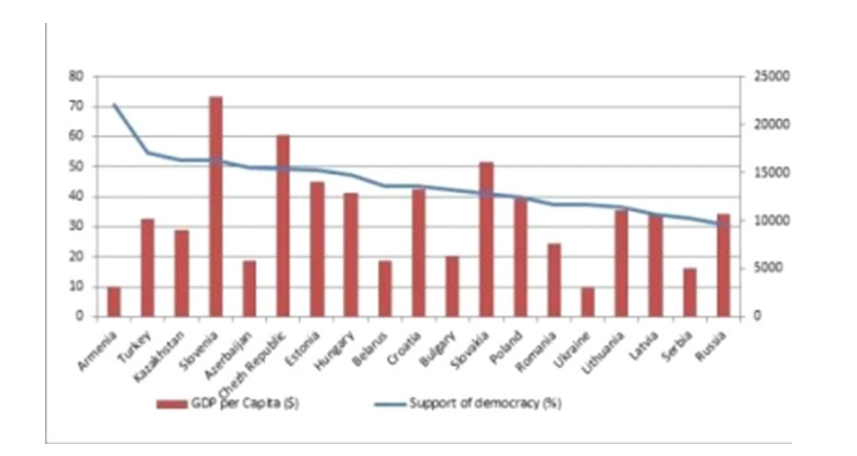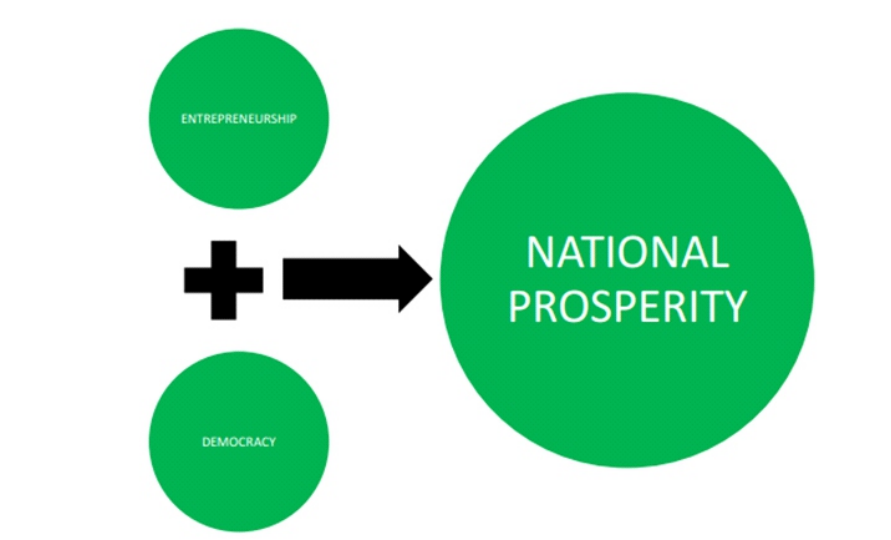ENTREPRENEURSHIP AND DEMOCRACY AS CATALYSTS FOR A PROSPEROUS NIGERIA
By Adesola Okunade (1st Position)
Have you ever wondered why, when Nigerians complain about their country, the conversation often centers around two critical issues: bad governance and a struggling economy? These are not mere complaints but reflections of profound challenges that hinder Nigeria’s potential. As the nation gears towards becoming the world’s fourth-most populous country by 2050, boasting Africa’s largest economy, the stakes for addressing these challenges have never been higher. A study by the Council on Foreign Relations underscores that improving governance and tackling corruption are pivotal to unlocking Nigeria’s economic potential and restoring public trust in its institutions.
Entrepreneurship, the art of navigating the unpredictable seas of starting, managing, and scaling businesses, emerges as a beacon of hope amidst these challenges. It is more than just a venture; it is a catalyst for economic growth and societal transformation. From humble startups to multinational ventures, entrepreneurship drives innovation, creates employment opportunities, and significantly contributes to the national income. In developing countries like Nigeria, where poverty and unemployment threaten stability, fostering an entrepreneurial culture not only mitigates these challenges but also propels the nation towards sustainable development.
On the other hand, democracy, a system where power resides with the people and is exercised for the common good, is equally indispensable. Beyond its political implications, democracy safeguards property rights, promotes accountability, and ensures a level playing field for businesses to thrive. The transition from military rule in 1999 marked a pivotal moment towards democratic governance, promising transparency and civic engagement. Yet, the journey towards realizing its full potential remains oppressed with challenges such as corruption and institutional weaknesses.
Nigeria’s economic and political landscape bears scars and triumphs from its history. The liberalization policies of the 1980s aimed to spur economic growth through privatization and market reforms, yielding mixed results of prosperity and social upheaval. Today, the focus is on diversifying the economy beyond oil, investing in sectors like agriculture and technology to harness the nation’s youthful population. Despite these efforts, Nigerian entrepreneurs grapple with unnerving
barriers—limited access to capital, inadequate infrastructure, and regulatory complexities—that stifle innovation and economic progress. Nevertheless, success stories abound. Nigerian entrepreneurs like Folorunsho Alakija exemplify the transformative power of entrepreneurship. Through ventures like Famfa Oil Limited and philanthropic efforts, Alakija has not only created jobs and contributed to GDP growth but also empowered women like me and invested in community development. Such initiatives underscore the potential of entrepreneurship to drive inclusive growth and prosperity across Nigeria.
Another example worthy of note is the CEO of Heirs Holdings. Tony Elumelu also demonstrates the transformative impact of entrepreneurship. Through the Tony Elumelu Foundation, Elumelu has championed entrepreneurship across Africa, providing seed funding, mentorship, and training to thousands of entrepreneurs. His commitment to fostering a new generation of African business leaders has not only created jobs and stimulated economic growth but also catalyzed social change and innovation. The Tony Elumelu Foundation Entrepreneurship Programme stands as a testament to the potential of private sector-led initiatives in driving inclusive development.
It is worthy of note that democracy and entrepreneurship are not isolated endeavors but interconnected pillars that support each other’s growth. Entrepreneurship flourishes in environments where democratic values—transparency, accountability, and fair competition—are upheld.
Conversely, a thriving entrepreneurial ecosystem strengthens democratic institutions by fostering economic stability and social cohesion. Initiatives like the Presidential Enabling Business Environment Council (PEBEC) and reforms in corporate governance laws demonstrate Nigeria’s commitment to creating a conducive environment for businesses to thrive.
ENTREPRENEURSHIP AND DEMOCRACY AS CATALYSTS FOR A PROSPEROUS NIGERIA
By Samuel Akpan (2nd Position)
Can Nigeria leverage its abundant human capital to reshape the country’s trajectory, steering it away from orbiting towards a black hole of anarchy but towards a future characterized by prosperity and advancement? Or is it overly optimistic to envision Nigeria overcoming the grip of corruption and becoming “The Nigeria of our Dreams”? The answers to these questions are undoubtedly intricate.
Nevertheless, it is clear that over time, a nation’s history can be amended. If time is a critical element in the nation’s advancement towards prosperity, then how can this gradual process of positive change be accelerated? This question leads us to a fundamental aspect of this discourse: Catalysts; that which can expedite the realization of the desired outcome. Therefore, if a thriving Nigeria is the aspiration that we earnestly pursue, then we must acknowledge the pivotal roles of entrepreneurship and democracy as time-efficient pathways to it. This acknowledgement brings us to the exploration of the topic of Entrepreneurship and Democracy as Catalysts for a Prosperous Nigeria.
Entrepreneurship and The Prosperity of Nigeria: Where the Intersection Lies According to Porter (1990), entrepreneurship is at the heart of national advantage. The provided statement eloquently underscores the essence and significance of entrepreneurship for a nation. Nigeria’s wealth of human capital positions it ideally to reap the full benefits of entrepreneurship.
Notably, a 2012 study by the Global Entrepreneurship Monitor identified Nigeria as one of the world’s most entrepreneurial countries, with 35% of its citizens involved in entrepreneurial activities. To harness this potential, the government should implement entrepreneurial-friendly policies to foster the growth of micro, small, and medium-scale enterprises. This approach would create job opportunities, mitigate unemployment, and drive economic growth.
Figure 1: Entrepreneurship as a Catalyst for Economic Growth

The Role of Democracy in the Realization of a Prosperous Nigeria
“Democracy is the foundation of prosperity.” – Lee Kuan Yew (Former Prime Minister of Singapore).
A country’s democracy significantly influences its economic growth and overall prosperity. Nigeria, with a democracy index of 4.23 and classified as a hybrid, faces challenges such as investor scepticism, corruption, and international isolation.
A robust democracy, on the other hand, attracts vital factors for economic growth. Evidence shows a strong link between democratic support and economic performance, measured in GDP. For instance, Slovenia, noted for its strong democracy, leads in GDP among the countries surveyed, underscoring the positive relationship between a well-functioning democracy and economic health.
Figure 2: Correlation Between Strong Democratic Support and GDP Per Capita (Source: WDI and LITS 2010).

Botswana as a Convincing Case Study on How Democracy and Entrepreneurship Can
Catalyze National Prosperity
The idea that Entrepreneurship and Democracy can act as driving forces for a prosperous Nigeria
would remain hypothetical without a specific reference, particularly from an African nation.
Botswana serves as an excellent example of how democracy and entrepreneurship can significantly
impact a country’s overall prosperity. According to Wikipedia (Economy of Botswana, 2024),
currently, Botswana boasts one of the world’s fastest growing economies, with an average annual growth rate of about 5% over the past decade.The country is rated as the least corrupt country in Africa by Transparency International. It has a corporate tax rate of just 15% compared to Nigeria’s 34%.Botswana’s embrace of sound democracy, reflected in its low corruption and its’ prioritization of entrepreneurship, are both contributing factors to the country’s GNP per capita, which is currently above the world average.
Figure 3: Entrepreneurship and Democracy as Catalysts for National Prosperity

Strategies for Harnessing Democracy and Entrepreneurship Towards The Prosperity of Nigeria
Outlined below are strategies that could leverage entrepreneurship and democracy to augment
Nigeria’s economic prosperity:
1. Provision of collateral-free loans to local entrepreneurs.
2. Reconfiguration of the educational curriculum to make entrepreneurship training mandatory in secondary schools.
3. Development of a home-grown democracy tailored to suit the political and economic landscape of Nigeria.
4. Establishment of a transparent government system where government spending is tracked, and accountability is maintained in government operations.
ENTREPRENEURSHIP AND DEMOCRACY AS CATALYSTS FOR A PROSPEROUS NIGERIA
By Runor Dafe (3rd Position)
Nigeria, often called the “Giant of Africa,” is a nation brimming with potential. Blessed with abundant human and natural resources, it’s a land of contrasts: immense wealth juxtaposed with significant poverty, vibrant culture against a backdrop of underdevelopment. Yet, amidst these challenges lie two powerful forces that can transform Nigeria into a beacon of prosperity: entrepreneurship and democracy. Together, they have the power to ignite economic growth, spur innovation, and ensure equitable development across the nation.
Imagine the bustling streets of Lagos, where entrepreneurial spirit runs high. It’s a place where dreams are built from the ground up, where young Nigerians harness their creativity and ambition to create something from nothing. Entrepreneurship isn’t just about starting businesses; it’s about driving change, creating jobs, and fostering innovation. In Nigeria, a country with a vast youth population, encouraging entrepreneurship could be the key to unlocking immense economic potential.
Take, for instance, the story of Chioma, a young woman from Abuja who turned her passion for fashion into a thriving business. With the help of initiatives like the Youth Enterprise with Innovation in Nigeria (YouWiN!) and the Tony Elumelu Foundation Entrepreneurship Programme, she received the funding, training, and mentorship needed to launch her brand. Today, she employs dozens of people, contributing to her community’s economy and inspiring other young Nigerians to follow their entrepreneurial dreams.
Technology has further opened doors for Nigerian entrepreneurs. The tech scene, fondly dubbed “Silicon Lagoon,” is a testament to this innovative spirit. Startups in fintech, e-commerce, and agritech are revolutionizing traditional industries, providing solutions to some of Nigeria’s most pressing challenges. Entrepreneurs like Chioma aren’t just creating wealth; they’re improving lives and setting the stage for a more prosperous future.
Yet, entrepreneurship alone cannot sustain a nation’s prosperity. It needs the steady hand of democracy to guide it. Democracy, with its principles of good governance, accountability, and the rule of law, creates an environment where businesses can thrive. It ensures that the growth spurred by entrepreneurship is inclusive, benefiting all sectors of society.
In a democratic Nigeria, every citizen has a voice in the decision-making process. This inclusivity ensures that policies supporting small and medium-sized enterprises (SMEs)—the backbone of the economy—are more likely to be implemented. Entrepreneurs can advocate for their needs, pushing for a business-friendly environment that fosters growth and innovation.
Democracy also brings transparency and accountability, essential ingredients for sustainable development. Corruption has long plagued Nigeria, diverting resources away from vital services and infrastructure. But in a democratic system, public officials are held accountable, and corruption is challenged by a free press, civil society organizations, and an independent judiciary. This fight against corruption ensures that resources are used efficiently, creating a more favorable environment for businesses to operate.
The Interplay between entrepreneurship and democracy is where true magic happens. Democratic institutions create stability, allowing entrepreneurs to take risks and invest in new ventures. In turn, these ventures drive economic growth, which supports and strengthens democratic institutions. It’s a virtuous cycle: as businesses flourish, the government collects more taxes, which can be reinvested into public goods like education, healthcare, and infrastructure. This reinvestment not only improves the quality of life for citizens but also creates a skilled workforce and better conditions for businesses to thrive.
Imagine a Nigeria where this synergy is fully realized. As the economy grows, the benefits of entrepreneurship and democracy become more apparent. Entrepreneurs like Chioma advocate for democratic values, using their influence to promote policies that foster a more inclusive and equitable society. They become champions of change, proving that economic success and democratic principles go hand in hand.
However, for this vision to become reality, certain challenges must be addressed. The government must create an enabling environment by investing in infrastructure, reducing bureaucratic hurdles, and providing access to finance for entrepreneurs. Strengthening democratic institutions, protecting human rights, and upholding the rule of law are equally crucial.
In the end, entrepreneurship and democracy hold the key to unlocking Nigeria’s vast potential. By fostering a culture of innovation and ensuring transparent and inclusive governance, Nigeria can achieve sustainable economic growth and development. This synergy can transform Nigeria into a prosperous nation where opportunities abound and the quality of life is high for all its citizens.
As Nigeria continues on its journey towards prosperity, it’s imperative that both the government and the private sector work together. By nurturing entrepreneurial talent and upholding democratic values, Nigeria can pave the way for a brighter future—not just for itself, but for the entire African continent. In this vibrant and dynamic interplay of entrepreneurship and democracy lies the promise of a truly prosperous Nigeria.


